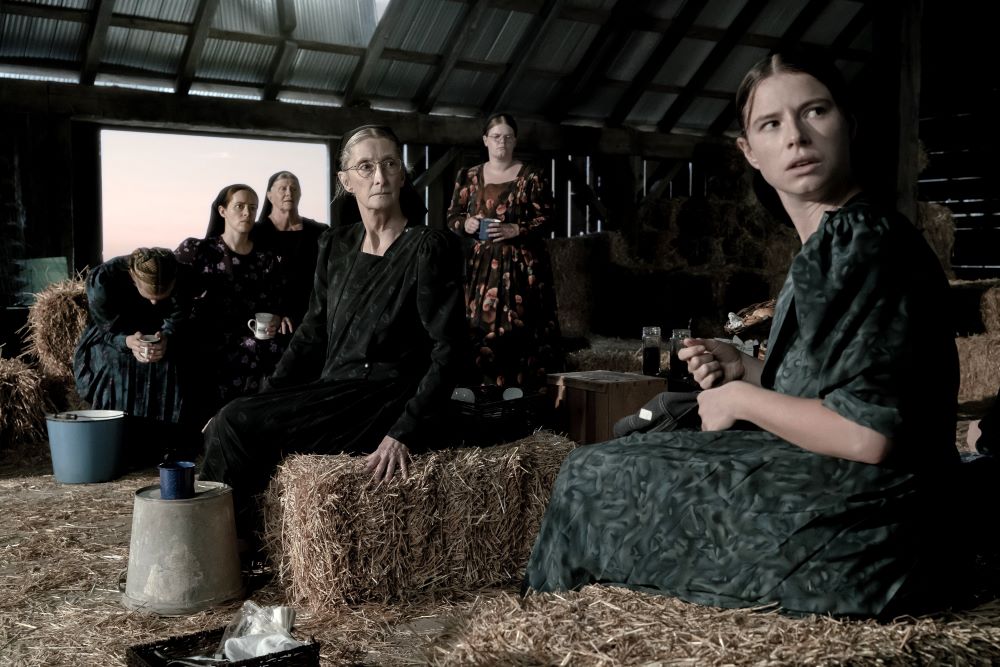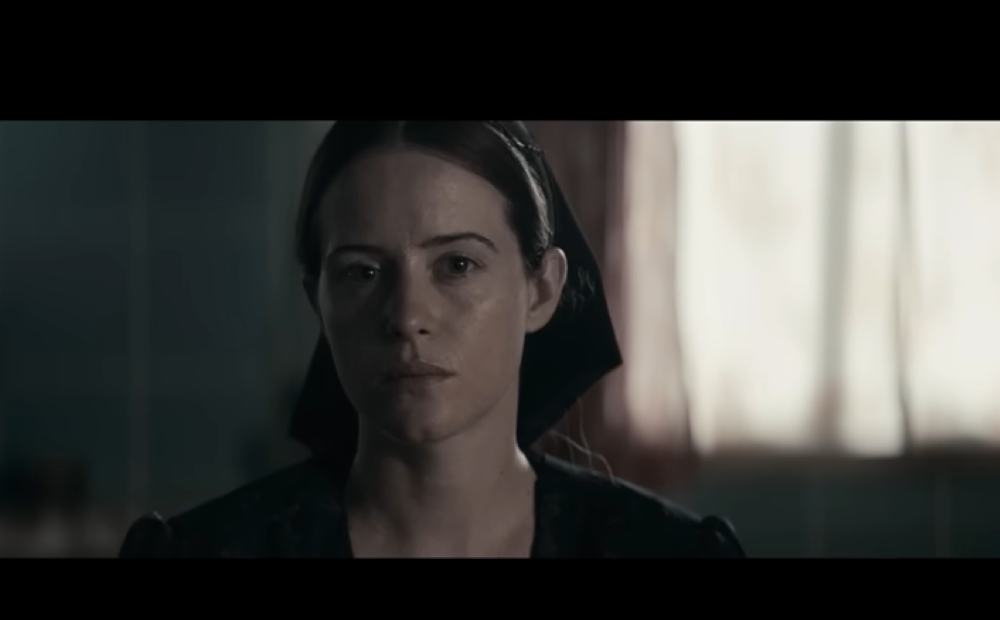
Rooney Mara, Claire Foy, Judith Ivey, Sheila McCarthy, Michelle McLeod, and Jessie Buckley star in a scene from the movie "Women Talking," based on Miriam Toews' 2018 book of the same name. The movie was named best adapted screenplay at the 2023 Academy Awards. (OSV News photo/Orion Pictures/Michael Gibson)
A warning, or perhaps a promise, precedes Sarah Polley's Academy Award-winning film: "What follows is an act of female imagination."
Be it a cheeky flip of the hysterical woman trope, be it a threat or be it a prayer, "Women Talking" delivers on this oath, presenting the viewer with arguably the most nuanced examination of sexual violence and systemic oppression to ever hit the big screen.
The film tells the story of a group of women living in a remote religious colony who were raped by men from their own community. The women do not know who, or how many, attacked them; they know only that they share the horrific experience of waking up, drugged with cow tranquilizer, covered in bruises and blood. Some of the rapists impregnated the women, including Ona, who is unmarried and carrying her attacker's child.
After one attacker is caught in the act and turned over to authorities outside the colony, all the men from the community head to the city to bail him out. In their absence, Ona and her mother, along with the women from two other prominent families in the community, have 24 hours to secretly convene in the loft above a barn to decide how they will respond.
From there, the film poses its central question, a question all too familiar to women around the world: Should the women flee, stay and fight, or stay and do nothing? To answer that question, the rest of the film fulfills the promise of its title, spending the entirety of its hour and 44-minute run compelling the audience to just listen as these women speak.
Should the women flee, stay and fight, or stay and do nothing?
This act of listening is exemplified by the one adult male in the film, August. A gentle soul, August is left in the colony with the women and children, as he is the school teacher and thus must stay and teach. In an act of trust, the women ask August to take the minutes during their discussion, as none can read or write.
And therein lies the greatest deviation that the film's creative team made from its source material, Miriam Toews' 2018 book of the same title. While August narrated the book, director Sarah Polley bestowed the honor of narrator upon a 16-year-old girl, Autje — a choice that feels almost Marian in nature. Autje narrates not to the audience, but to Ona's unborn baby, telling the child that "this story ends before you were born." This makes it clear that this is a story of survival, the type of thing that once endured, can be processed through storytelling and question-asking and filmmaking.
A smaller but also noteworthy creative change is that the film takes place in a sort of vacuum, outside time and space and religious labels. Toews' book clearly tells the story of a Mennonite colony in Bolivia in the early 2000s, details she borrowed from the true stories she based her book upon. Polley's film, however, never specifies where and when this story takes place, making the point that sexual violence can and does happen anywhere at any time to any sort of people.
Perhaps the most merciful creative decision was to not show the attacks on screen. While there are moments that portray the bloody aftermath of these assaults and the miscarriages they often produce, the movie is remarkably nonviolent. Even at its most graphic, the film upholds the dignity of the women whose stories it tells — not denying the violence they've endured, but not allowing for a moment of voyeurism into the inhumanity of their attacks, either.

Claire Foy portrays Salome Friesen, the mother of a 3-year-old who has been raped, in "Women Talking." The movie won a 2023 Academy Award for best adapted screenplay/ (NCR screenshot/YouTube)
"Women Talking" makes it clear who this story is for and sets a new precedent for accessibility in storytelling about rape. With discretion of course, this is a film about sexual violence that is made, first and foremost, for women who have endured it themselves.
And as awful as it is, enduring crimes like these are not just a burden that strong, adult women bear. The victims of the real attacks that inspired this story ranged from 3 to 65 years old. In a nod to this horrific reality, the film highlights three generations of women as the ticking of the clock harmonizes with the echo of that looming question: Flee, stay and fight, or stay and do nothing?
The juxtaposition is startling: Teenage girls giggle and braid each other's hair while grandmothers acknowledge aloud that they know they won’t live to see the fruit of the work they're doing, but they think they should do it anyway. Between them stand the pillars of the community: the mothers.
Most of the debate takes place between the mothers, summed up in the desperation on one woman's face as she looks at her daughter, realizing that what happened to her could one day happen to her little girl as well: "There are no cons to leaving."
Despite its lack of "action," the film masterfully creates and holds a tension that keeps viewers' attention. In an industry that thrives on desensitizing viewers, "Women Talking" dares to accomplish what only a feminine touch could do: to leave the audience members more sensitive than it found them, to art, to suffering and to each other.
Advertisement
After so much of the conversation around sexual violence has been politicized and the #MeToo movement has experienced backlash equal to its success, some viewers may be hesitant to sit through almost two hours of what they may assume will be extreme feminist propaganda. But I have to wonder if there's an element, something they aren't aware of themselves, a voice that asks: "Why would I subject myself to hours of 'entertainment' about rape?"
Let me dispel those fears. "Women Talking" transcends both politics and entertainment to provide something much more valuable: art, healing and common ground in a time when we need it most. The Catholic viewer will be relieved to find that despite taking place among people of faith and acknowledging how religious communities can easily become breeding grounds for sexual predators, this film in no way pokes fun at or degrades Christianity.
The theme of unconditional love imbues the entire film, especially in moments where the women rebuke any suggestions that they would love the children conceived through rape any less than a child conceived in love. As Ona, a personification of Christian virtue, explains: "I already love this child more than anything. He or she is innocent. So was the child's father when they were born."
At the end of the film, the women make their final decision by reciting Philippians 4:8 to each other and measuring their options against that standard:
Finally, brethren, whatever is true, whatever is honorable, whatever is right, whatever is pure, whatever is lovely, whatever is of good repute, if there is any excellence and if anything worthy of praise, dwell on these things.
Not only does the women's final decision beautifully illustrate this verse, but the entire film does as well.








